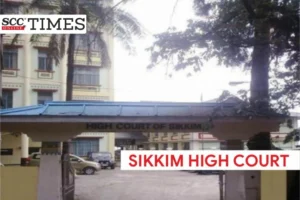Sikkim High Court: In an application for condonation of delay on appeal made under Section 5 of the Limitation Act, 1963 (“Limitation Act”) by the applicant-State against a judgment of the Special Judge, Protection of Children from Sexual Offences Act (“POCSO”), the Division Bench comprising of Bhaskar Raj Pradhan* and Meenakshi Madan Rai JJ., allowed the application but also imposed costs on the applicant for delay. The Court found that there was sufficient cause for delay on the part of the applicant, however it also noted that the brunt of delays in criminal prosecutions are borne by the victims more than by the court bureaucracy that operates in a lethargic manner, causing delays.
Background
The applicant had made an application under Section 5 of the Limitation Act for the condonation of delay of 273 days in preferring criminal appeal against the judgment passed by the Special Judge, POCSO, on 30-06-2022, in the matter of State of Sikkim v. Rup Narayan Rai1.
The applicants explained the delay on various grounds, wherein all the elementary stages of judicial bureaucratic methodology added to the delay in filing an appeal.
Court’s Analysis and Judgment
The Court noted the multitude of cases referred to by the parties, condoning lengthy delays, or rejecting applications based on sufficiency of cause. However, the Court stated that Section 5 of the Limitation Act (“Section 5”) is centered around “sufficient cause”. Therefore, a pragmatic approach must be adopted when substantial justice and technicalities are face-to-face, and substantial justice must be elected over the latter; and Section 5 should be construed liberally.
The Court said that there cannot be a straightjacketed formula for deciding applications for condonation, however, it further said that accepting the explanation furnished should be the rule, and refusal, an exception, unless gross negligence or deliberate inaction or want of bona fides are glaringly visible.
The Court stated further that, while it is important that litigants including the State are accorded the same treatment and the law is administered in an even handed manner, a little latitude is considered by the Courts when the State is the litigant since it is common knowledge that decisions are taken at slow pace and encumbered process of pushing the files from table to table and keeping it on table for considerable time causing delay although it is deprecated. Public interest invariably suffers if appeals filed by the State are rejected on the grounds of delay and not considered. A justice oriented pragmatic approach is always preferred although the Courts deprecate these practices and bureaucratic red-tapism in the process of decision making.
The Court further noted that the application seeking condonation of delay was lacking in some details, however, there was no lack of bona fide on the part of the State, and that there had been no attempt to mislead the Court by giving a false explanation.
The Court noted that the impersonal bureaucratic machinery consumed with redundant practices of file-pushing, passing-on-the-buck etc., the delays thereof caused is a delay in the delivery of justice.
In the case against which the instant application was filed, the Special Court had acquitted the respondents on the ground that the prosecution had failed to prove its case beyond reasonable doubt. Evidently, the trial was against the respondents for serious criminal charges.
The Court highlighted that a lack of diligence, lethargic approach, impersonal attitude of the State officers in criminal prosecutions affects both the State and the victims, however State Officers rarely suffer from these factors as much as the victims do. Therefore, these factors should be considered by courts while granting a condonation of delay, said the Court while referring to State of Sikkim v. Tenzing Bhutia, 2018 SCC OnLine Sikk 189.
Concluding, the Court was convinced that the State had shown sufficient cause for the condonation of delay and, but also viewed that the lethargy and indecisiveness of the Law Officers, and the lengthy process of decision making adopted by the State Officers could not overrun the cause of substantial justice for the victim.
Therefore, the Court while allowing the application for condonation of delay, imposed costs of Rs. 20,000 on the State to be paid to the Sikkim State Legal Services Authority, Gangtok.
[State of Sikkim v. Rup Narayan Rai, 2024 SCC OnLine Sikk 23, decided on 15-05-2024]
*Judgment by: Justice Bhaskar Raj Pradhan
Advocates who appeared in this case :
Advocates for the applicant: Yadev Sharma and S.K. Chettri, Additional Public Prosecutors
Advocates for the respondents: K.T. Bhutia, Senior Advocate and Sishir Mothay, Advocate
Buy Protection of Children from Sexual Offences Act, 2012 HERE
1. Sessions Trial (POCSO) Case No. 27 of 2020

